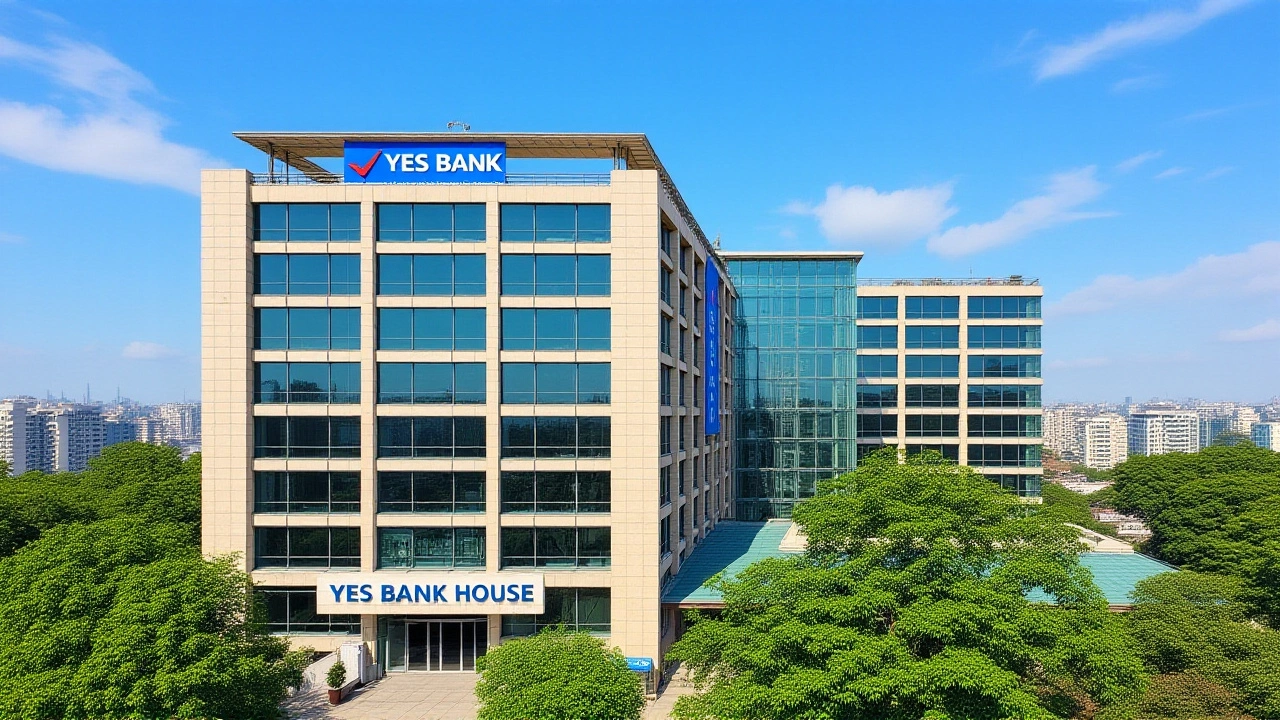When Yes Bank, a Mumbai‑based private lender, saw the Reserve Bank of India's green light on August 22, 2025, its stock instantly jumped, climbing as much as 8.4% in a single session and settling at a solid 4.77% gain on Monday, August 25, 2025.
The approval lets Sumitomo Mitsui Banking Corporation (SMBC), one of Japan’s banking giants, purchase up to 24.99% of Yes Bank’s paid‑up capital – a transaction valued at roughly ₹13,483 crore (about $162 million). Investors cheered not just the cash influx but also the fact that RBI explicitly stated SMBC would not become a promoter, preserving the bank’s governance independence.
Background: Yes Bank’s Recovery Path
Founded in 2004, Yes Bank weathered a severe liquidity crunch in 2020, prompting a rescue package led by the State Bank of India (SBI) and several private lenders. By mid‑2025, the bank had trimmed its non‑performing asset ratio to 4.2% and posted a modest net profit of ₹1,238 crore for Q2 FY 2025, powered by a 6.5% year‑on‑year rise in loans and a 7% lift in deposits.
That turnaround attracted foreign interest, especially after the bank’s CASA (current‑and‑savings‑account) ratio nudged above 50%, a metric investors view as a sign of low‑cost funding. In other words, the bank was finally walking on solid ground, and SMBC saw an opportunity.
Details of the SMBC Stake Transaction
The RBI’s approval, issued as an stake‑acquisition clearanceMumbai, outlines a two‑pronged purchase plan:
- 13.19% from State Bank of India, which held a 23.96% stake as of June 2025.
- 6.81% from a consortium of seven Indian banks – Axis Bank, Bandhan Bank, Federal Bank, HDFC Bank, ICICI Bank, IDFC First Bank and Kotak Mahindra Bank.
The total cash consideration of ₹13,483 crore is expected to flow into the selling banks’ balance sheets, bolstering their own capital buffers. The RBI’s one‑year validity period gives SMBC a clear deadline to close the deal, after which the stake will be locked under the usual foreign‑investment caps.
Market Reaction and Investor Sentiment
On the trading floor, the news sparked a flurry of buying. Yes Bank’s shares opened at ₹20.20 on the NSE, surged to ₹19.70 within minutes, and by 11:10 AM IST were hovering at ₹19.66 – a tidy 2% rise from the previous close. The BSE Sensex, meanwhile, nudged up 0.29% to 81,546 points, reflecting broader confidence in the banking sector.
Analyst Rohit Mehta of Narayana Capital summed it up: “The SMBC stake is a vote of confidence in Yes Bank’s post‑restructuring trajectory. It also injects foreign expertise without compromising governance, a sweet spot for investors.”
Benchmarks from the week show an 11% cumulative rally, pushing the 52‑week high to ₹24.84 and the low to ₹16.02. With a market capitalization of ₹62,112 crore, Yes Bank now ranks among the top five private lenders in India by market value.
Regulatory and Governance Implications
The RBI’s clarification that SMBC will not be treated as a promoter matters. In India, promoters enjoy certain voting rights and board representation, which can tilt strategic decisions. By keeping SMBC out of that category, the regulator ensures that Yes Bank retains its autonomous board, while still benefitting from SMBC’s capital and international best practices.
Foreign investors – notably CA Basque Investments (4.22%) and Verventa Holdings (9.2%) – already hold a combined 13.42% of the bank. Adding SMBC’s near‑25% slice will push foreign ownership close to 38%, still under the 49% ceiling for banks. The move signals a gradual opening of India’s banking sector to overseas capital, a trend that the Ministry of Finance has been nudging for years.
Future Outlook: What This Means for Yes Bank and Indian Banking
Looking ahead, the infusion of SMBC’s capital could fund several strategic bets: expanding digital lending, deepening SME outreach, and possibly venturing into green finance. SMBC’s own sustainability pledge aligns with India’s push for climate‑friendly loans, a niche Yes Bank has been exploring.
However, the deal is not without risks. A higher foreign shareholder base may raise scrutiny from both RBI and the Securities and Exchange Board of India (SEBI) regarding compliance and reporting standards. Moreover, the global banking environment remains volatile, with interest‑rate hikes in the U.S. potentially tightening liquidity.
Still, most market watchers agree that the net effect is positive. If the transaction closes by August 2026, Yes Bank could see its capital adequacy ratio climb by 0.8‑percentage points, unlocking further growth avenues.
Frequently Asked Questions
How does SMBC’s stake affect Yes Bank’s governance?
RBI explicitly stated that SMBC will not be classified as a promoter. This means SMBC cannot unilaterally influence board decisions, preserving the existing governance structure while still providing a sizeable capital boost.
What is the total monetary value of the stake acquisition?
The transaction is valued at roughly ₹13,483 crore (about $162 million), covering a 20% combined stake bought from SBI and a consortium of seven Indian banks.
Will foreign ownership exceed regulatory limits?
Even after SMBC’s entry, foreign ownership is projected to stay under the 49% cap imposed on Indian banks, because domestic banks still hold a 33.7% share and other foreign investors own about 13.4%.
What impact could the deal have on Yes Bank’s capital adequacy?
Analysts estimate that the fresh capital could lift Yes Bank’s capital adequacy ratio by roughly 0.8 percentage points, giving the lender more leeway to expand its loan book and meet regulatory stress‑test requirements.
How does this investment compare with other foreign stakes in Indian banks?
At close to a 20% stake, SMBC’s move ranks among the largest single‑handed foreign investments in an Indian private bank, eclipsing earlier purchases like the 10% stake by Japan’s MUFG in Kotak Mahindra Bank in 2023.





